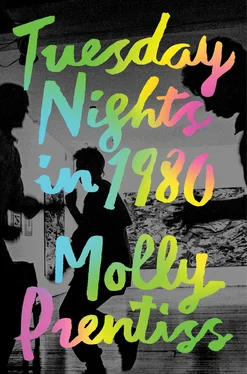“Do you see me laughing?” he said.
Marge laughed more, and started to cry, too. “You are laughing, James.”
“That’s because it’s funny! I’m asking you to marry me! Me! Asking you! To marry me! It’s absurd! I’m absurd! I’m absurd and you’re wonderful! And here I am asking you—”
“Yes,” she interrupted, kissing him with her salty mouth. “I say yes, you weirdo.”
This yes was a promise. A midnight promise. A middle-of-the-road-at-midnight promise. Another of James’s wild sensations, crashing around the New York night, landing in his brain like a wonderful dream. But it was also a different kind of promise. A promise that, because the world had agreed collectively to formally acknowledge such promises, was to society. It was a promise to adulthood, a promise that James was a man, a promise that he would become the man he thought of when he thought of a husband : someone capable, reliable, strong-willed, good. Yes, they were young. Yes, James was inexperienced when it came to what he and Marge kept referring to as “real life”—life outside of an academic setting, where more counted than pages written per night or the grade you got on your term paper. Yes, there would be tough times, big fights, months where they didn’t have enough money, doubts and fears. But all of this was eclipsed by the symbolic yes: things were going to be different when they were married. When they put those rings on each other, they were going to grow up.
After the wedding — an expensive affair hosted by Marge’s family in Connecticut — they moved from their tiny Columbia apartment into a little wooden house in the Village. Marge got a job as an art director at an advertising agency called — absurdly, James thought— Agency, having applied solely based on the fact that the job had art in its title. She seamlessly fell into a nine-to-five routine, slicking her hair back in new ways, coming home with beautiful groceries, talking about her coworkers with equal parts resentment and enjoyment. James, though, had had a rockier transition into reality. If you didn’t count writing articles for the Spectator , which hadn’t paid, James had never in his life held a job, and by certain definitions was practically unemployable. The jobs he did land that first year were of the odd sort — James was a movie-ticket ripper and a lightbulb screwer-inner and a travel agent’s assistant and a typist for a writer of astrology books. None of it worked out, and whether it was because of James’s odd mannerisms (wandering mind, poor sense of time and responsibility, constant references to things other people did not know or could not see) or his own boredom (typing did not hold his attention), he could not say. He understood that he was intelligent, but it was an odd sort of intelligence that others could not quite see, and he could not seem to figure out how that translated to a job, a real job in the real world.
But simultaneously, he was discovering a whole new world, the world of downtown New York, which had only one requirement for acceptance: interest. And James had that in spades. Immediately upon moving to the Village, by sheer proximity to so much art — its makers and its dealers and its lovers — James’s mind erupted with a cacophony of ideas, colors, sensations, and images. He could hardly control himself: he wanted to taste the art, to feel it, to hold it, to have it. The right sculpture could still give him a hard-on (occasionally trips to the Met got embarrassing) and he continued to discover colors that were actually new, that he had never seen before.
“It was like a bruised peach,” he’d try to explain to Marge, whose infatuation with his mental metaphors was waning very slightly, a fact that he did not care to admit to himself. “But if you mixed some honey in.”
He stalked galleries in the daytime when no one else was there, standing for long stretches in front of pieces that made him hear beautiful music. He took photographs of the pieces and made them into slides that he could flip through in his study at night, keeping them in big brown leather binders, organized in an associative language that only James could understand. (LIGHT, read the spine of one binder. LIGHT BLUE, read another.) And though he was not big on crowds or schmoozing or hand shaking — in fact he was awkward and claustrophobic, often saying the exact wrong thing to the exact wrong person — he went to an opening almost every night; he simply could not get enough of what they opened for him.
Every kind of everything was going on downtown in those years, and he’d see any of it, whether it was at the pristine Midtown museums or the shitty new spaces in SoHo. Cindy Sherman’s slick, sick realism; Robert Barry’s conceptual, whimsical way with words; Jenny Holzer’s very true Truisms (“A SENSE OF TIMING IS THE MARK OF GENIUS”; “AT TIMES YOUR UNCONSCIOUS IS TRUER THAN YOUR CONSCIOUS MIND”; “A LOT OF PROFESSIONALS ARE CRACKPOTS”), which were not displayed in a gallery but around the city on white broadsheets, exposing the city to its injustices and realities, to its face.
James loved it all: art as object and art as action, stiff irony and loving expressionism, nonsensical tape recordings and super-self-conscious poetry performances; he loved the appropriators and the activists and everyone in between. Still, though, the largest part of his heart belonged to the painters. Paintings, though the stodgiest and definitely the flattest form, always gave James the most pleasure. He could do cerebral for only so long before he gravitated back toward the paintings, in whose faces he could see the most real passion. It seemed honest in a way that no other form, not even photography, did. It was closest, James thought, to his own practice: an individual’s perception of the universe, a map of a mind. When James read about a painting show in the Times , he often got to the gallery before the doors opened, stayed until they closed. For the hours in between he let the two-dimensional works turn on the many dimensions of his brain.
When he looked at art or wrote about it, it was as if James’s brain were on fire: suddenly the entire universe seemed available and clear. He saw giant perspectives and tiny details. He felt gushes of wind and crawling ants, tasted burnt sugar and gazed at skies’ worth of stars. He forgot about all the parts of life that were not worthy of his thoughts: dirty laundry and dirty bathrooms, small favors for Marge and small talk with colleagues, phone calls to his mother and phone bills due last month. Everything disappeared except what mattered: the potent, powerful stuff of life, the heart explosions, the color, the truth.
In his notebook, he jotted down the sensations he felt while looking at the work, no matter how nonsensical they might seem— Louise Fishman=strong smell of shampoo; Bill Rice=nocturnal mood, headache. When he got back to the house, with Marge already asleep, he would view the slides and type down his notes on his typewriter — version after version until it made some sort of sense as an art review. Every Friday he would seal one of the pieces into a manila envelope and walk it over to the New York Times building, where he dropped it in the arts editor’s mailbox. Upon releasing the envelope he always felt the same combination of convictions: that the editor would never read it and it would never see the light of day, and that it was bound to be read by someone, and that when that someone did read it, it would captivate them so completely they could not deny its publication.
“I honestly can’t understand if what I’m writing is good or total shit,” he told Marge. “Which is ironic, isn’t it, considering that I’m trying to forge a career out of understanding what is good and what is total shit.”
Читать дальше












